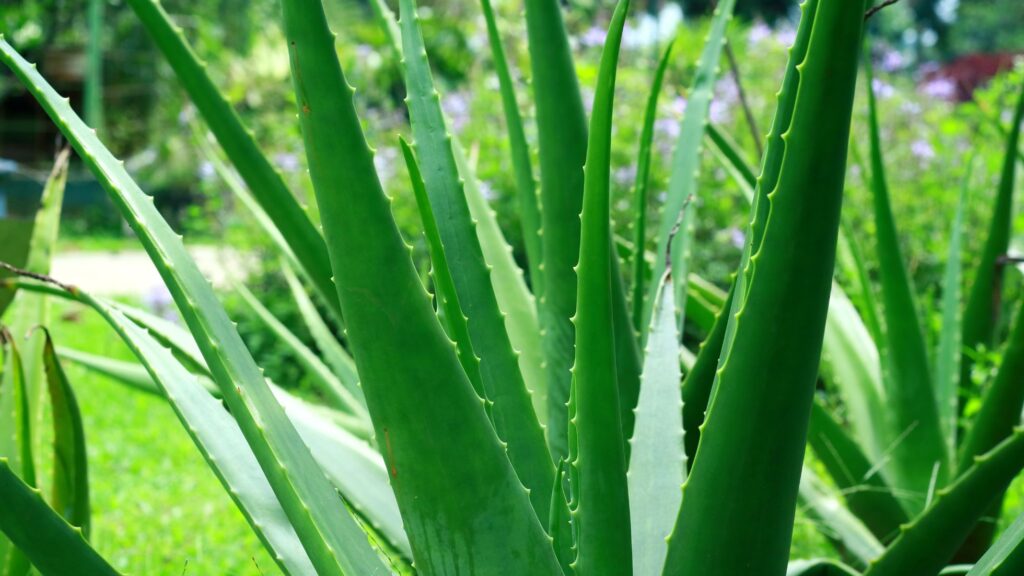Our digestive systems carry out essential functions every day that impact whole-body wellness. When the gut is compromised through conditions like leaky gut, dysbiosis, or IBS, whole-person health can suffer as a result. As an herbalist, I’m always seeking solutions to support the gastrointestinal tract naturally. Could the succulent plant aloe vera offer therapeutic potential for gut healing? In this article, we explore current research on aloe vera’s actions within the digestive system and what that may mean for overall GI care and repair.
Does Aloe Vera Heal The Gut?
Aloe vera’s anti-inflammatory mannans and gel-forming compounds support gut healing. Studies find aloe reduces digestive distress and reinforces the intestinal lining. As a hydrogel, it forms a protective coating for irritated bowel tissues. Clinical research highlights aloe vera’s natural abilities for safely soothing gut irritations. Here is also some research you should consider about the question:

1. Aloe Contains Compounds that Soothe Irritation
A major factor in gut distress involves chronic irritation and inflammation within the intestines. Aloe boasts two unique mannan polysaccharides—acemannan and galactomannan—that exert anti-inflammatory properties through multiple mechanisms. Studies find these compounds can help reduce levels of inflammatory cytokines like TNF-alpha associated with gut inflammation. Aloe vera also contains anthraquinones that may have laxative effects useful in certain cases yet soothing when managed judiciously. Overall, its anti-inflammatory toolkit helps counter-irritation at the root of many digestive issues.
2. Aloe Supports a Balanced Microbiome
A healthy, diversified microbiome forms a defensive barrier against pathogens while aiding nutrient absorption. Aloe may offer prebiotic fiber to feed beneficial flora in the intestines. Research suggests it encourages the growth of Bifidobacteria and Lactobacilli, microbes critical for gut immunity and regulation. Certain aloe compounds even exhibit antibacterial effects that could help rebalance overgrowths without broadly disrupting flora. Together, these properties may resuscitate a depleted or dysbiotic microbiome community over time for improved digestive function.
3. Aloe Creates a Protective Coating
Within the lower GI tract, aloe forms a coating gel when combined with foods and fluids. This hydrogel matrix soothes irritated tissues while blocking access of allergens and infectious agents to intestinal lining surfaces. The gel’s sugars also regulate water entry into the large bowel for smoother elimination. Together, these lining-protective and hydrating impacts could aid recovery of “leaky gut,” or help reduce diarrhea, IBS and other inflammation-driven conditions exacerbated by irritant exposure in the gut.
4. Clinical Trials Show Effectiveness
In studies, aloe vera achieved positive outcomes for issues like acid reflux, ulcerative colitis, Crohn’s, IBS, and celiac disease when taken over 8-12 weeks as either a supplement or juice. Researchers noted a reduction in digestive symptoms, decreased inflammation, and improved integrity of gastrointestinal barriers. Animal research parallels these findings and provides insight into aloe’s comprehensive mechanisms. Overall, clinical evidence supports aloe’s use as an adjunctive tool in gut repair protocols.
5. Safety and Best Practice
While quite gentle, aloe gel intake should start gradually to monitor tolerance. The pure inner gel—not full latex—contains the compounds that soothe without laxation. Limit intake to the equivalent of one to two aloe leaves daily during gut healing. Fresh aloe may irritate compromised tissues, so aloe vera supplements standardized for polysaccharides appear optimal until recovery progresses. With judicious use as part of a comprehensive protocol, aloe vera shows promise as an herbal ally for GI welfare.
Conclusion
Current research indicates aloe vera deserves recognition as a multi-talented gut-restorative herb. Its array of anti-inflammatory, restorative and protective actions target the root causes of digestive distress. When employed judiciously alongside dietary and lifestyle changes, aloe vera’s comprehensive abilities to soothe irritations, nourish beneficial flora and reinforce intestinal barriers suggest promise for safely healing damaged guts over time. Further confirmation in additional quality human trials could strengthen these findings yet existing evidence highlights its potential as an important herbal factor in digestive wellness regimens.




